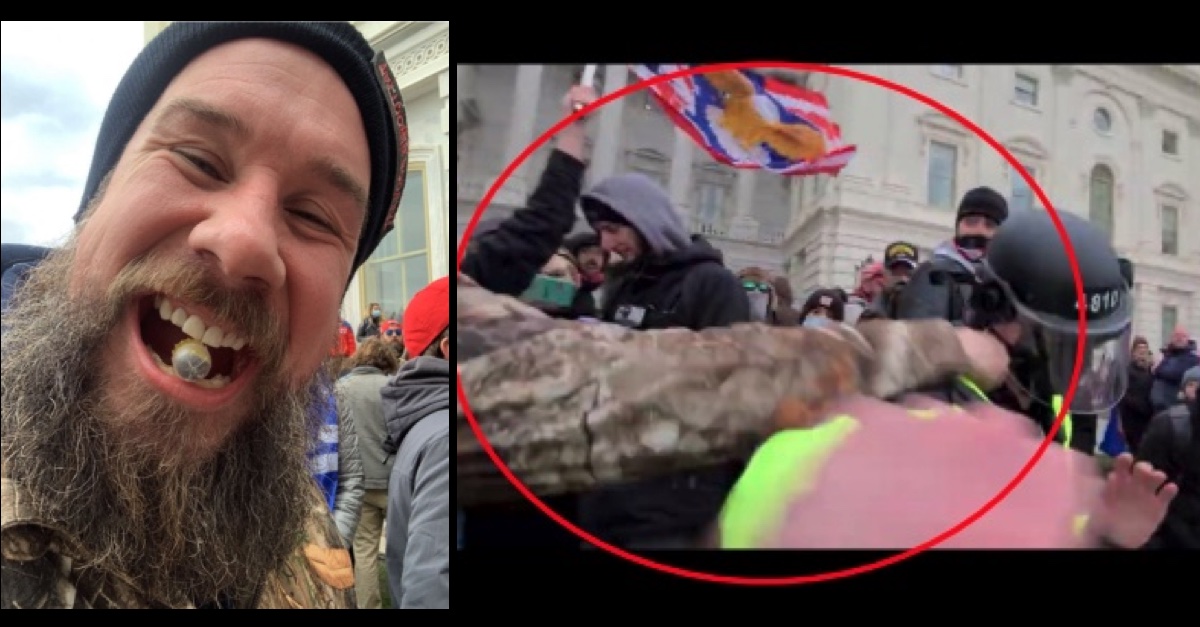
Scott Fairlamb’s Jan. 6 “selfie” with a pepper ball between his teeth; Fairlamb punching police officer (photos via Department of Justice filing)
The ex-MMA fighter from New Jersey who punched a police officer at the Capitol on Jan. 6 and was sentenced to more than three years in prison has withdrawn the notice of appeal he filed in December, but his lawyers say the case is “far from over.”
Scott Fairlamb, who cheerfully posed for a selfie outside the U.S. Capitol building while holding a pepper ball between his teeth, was among the scores of Donald Trump supporters who overran police and swarmed the building on Jan. 6 in an effort to stop the Electoral College certification of Joe Biden‘s win in the 2020 presidential election.
He pleaded guilty in August to assaulting a police officer and obstructing congressional proceedings, and in November, he was sentenced to 41 months in prison.
“You were part of the overall circumstances that led to the obstruct [and the] inability of congress to function, the inability of the electoral college to go forward that day,” Senior U.S. District Judge Royce Lamberth, a Ronald Reagan appointee, told Fairlamb at the sentencing hearing. “The offense itself that you committed is so at the heart of our democracy that I cannot in good conscience go below the [sentencing] guidelines.”
Fairlamb filed a notice of appeal on Nov. 24, the last day he was legally allowed to do so under federal appeal laws.
At the time, it was unclear what the basis of Fairlamb’s appeal would be. He had waived most of his appeal rights when he pleaded guilty.
On Thursday, Fairlamb’s attorney told Law&Crime that upon closer review, a direct appeal of Fairlamb’s case isn’t feasible.
“The Notice of Appeal was filed because we were contacted the day the appeal was due,” attorney Dennis Boyle said. “After reviewing the record, there were no appeal issues. We anticipate filing a 2255 motion in the future.”
A “2255 motion” is an appeal filed pursuant to 28 U.S.C. § 2255, which allows for a collateral attack—such as a claim of ineffective assistance of counsel—on a conviction and sentence.
“We are investigating the case to determine what happened in the guilty plea and sentencing,” Boyle said. “The case is far from over. There is a lot more investigation to be done, and we anticipate filing something in the not-too-distant future.”
Fairlamb is not the only Jan. 6 defendant to file a post-conviction appeal after a guilty plea and prison sentence. Paul Hodgkins, who was sentenced in July to eight months in prison after pleading guilty to a felony obstruction charge, had previously indicated an intent to appeal, although a Sept. 15 docket entry from U.S. District Judge Randolph Moss noted the absence of Hodgkin’s “as-yet-unfiled Section 2255 petition.”
Jacob Chansley, the so-called “QAnon shaman” who was pictured on Jan. 6 standing behind former Vice President Mike Pence’s Senate dais in a horned, coyote-fur headdress and red, white, and blue face paint, also filed a notice of appeal in November. Lamberth gave Chansley the same sentence he gave Fairlamb—41 months in prison—and had called him “the very image of the riot.”
You can read Fairlamb’s motion to withdraw notice of appeal below. (Note: Boyle told Law&Crime that the reference to “Mr. Jenkins” was made in error and is being corrected; it should read “Mr. Fairlamb.”)
[Images via FBI.]